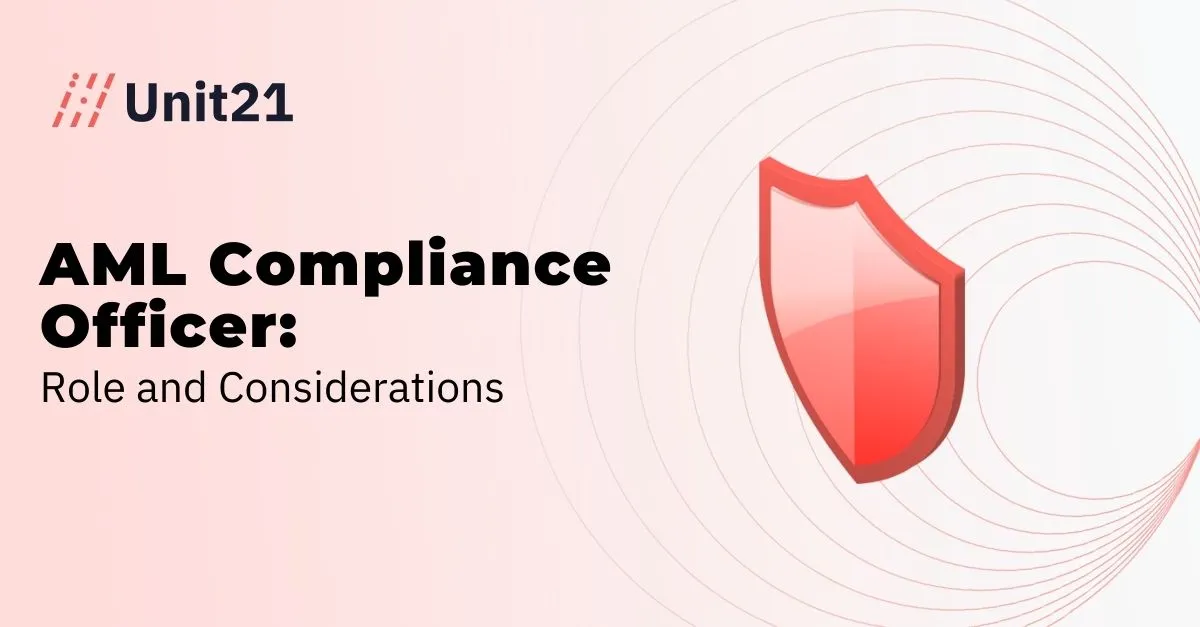

Money laundering and other financial crimes can have severe consequences, from enabling organized crime to funding terrorist activities.
To combat these risks, financial institutions rely on Anti-Money Laundering (AML) compliance officers to ensure their operations adhere to laws and regulations designed to prevent financial crimes. These unsung heroes of the financial world play a crucial role in detecting, preventing, and reporting suspicious activities that may indicate money laundering, terrorist financing, or other illicit financial activities.
In this article, we'll explore the essential duties and responsibilities of AML compliance officers and why their work is essential in protecting our financial system from abuse.
What is an AML Compliance Officer?
An AML (Anti-Money Laundering) compliance officer is responsible for ensuring that a financial institution, such as a bank, adheres to laws and regulations designed to prevent money laundering and other financial crimes. The role of an AML compliance officer is crucial in ensuring that financial institutions comply with these laws and regulations to protect against the potential risks of money laundering, terrorist financing, and other financial crimes.
Anti Money Laundering Compliance programs are necessary for governments worldwide to combat the increase of financial crime, however, implementing programs does not come without its challenges.
Companies now have the challenging task of ensuring compliance with many complicated laws and acts including the Bank Secrecy Act (BSA) and the Patriot Act. Failing to adhere to AML compliance programs can result in major legal consequences. AML compliance officers are often crucial to managing the implementation of a company’s AML program.
AML Compliance Officer Role: What Do They Do?
AML compliance officers should implement a company-wide AML policy and should focus on the internal systems implemented to try and detect as well as prevent money laundering activities, and report them to the authorities. Ideally, they'll be able to reduce AML compliance costs along the way as well.
All employees should still be aware of the company’s AML policy even if they are not the AML compliance Officer. The AML compliance officer must also ensure that the institution doesn’t accidentally aid Money Laundering and isn’t susceptible to criminal risk.
The specific duties of an AML compliance officer may vary depending on the financial institution and the regulatory environment in which it operates, but generally, an AML compliance officer is responsible for the following:
- Developing and implementing policies and procedures: An AML compliance officer is responsible for developing and implementing policies and procedures that are designed to prevent money laundering and other financial crimes. These policies and procedures should comply with the relevant laws and regulations and should be regularly reviewed and updated as necessary.
- Conducting risk assessments: An AML compliance officer is responsible for conducting risk assessments to identify potential money laundering and other financial crime risks associated with the financial institution's products, services, customers, and geographic locations.
- Conducting due diligence: An AML compliance officer is responsible for conducting due diligence on customers, vendors, and other parties to ensure that they are not involved in money laundering or other financial crimes.
- Monitoring transactions: An AML compliance officer is responsible for monitoring transactions to identify suspicious activity that may indicate money laundering or other financial crimes.
- Reporting suspicious activity: An AML compliance officer is responsible for reporting suspicious activity to the relevant authorities, such as law enforcement or financial intelligence units.
- Providing training: An AML compliance officer is responsible for providing training to employees on the institution's policies and procedures, as well as on identifying and reporting suspicious activity.
How to Select an AML Compliance Officer
Due to the extreme importance of an AML compliance officer, it is crucial that senior management chooses someone who suits the institution’s unique professional needs as well as has the ability to do their job effectively. When selecting an AML compliance officer, it is important to take the following factors into account.
5 Critical AML Compliance Officer Traits
To become an AML compliance officer, there are no specific educational requirements, although many employers prefer candidates with a bachelor's degree in finance, accounting, or a related field. Additionally, employers generally require several years of experience in a related field, such as banking, law enforcement, or regulatory compliance.
In addition to the factors listed above, AML compliance officers should possess:
- Strong knowledge of AML laws and regulations: AML compliance officers must have a thorough understanding of the laws and regulations related to money laundering and other financial crimes. They must keep up-to-date with changes in regulations and adapt policies and procedures accordingly.
- Attention to detail: AML compliance officers must be detail-oriented to identify and investigate suspicious transactions and activity effectively. They must also be able to spot inconsistencies and anomalies in financial transactions and customer behavior.
- Analytical skills: AML compliance officers must be able to analyze large amounts of data to identify patterns and trends that may indicate money laundering or other financial crimes.
- Communication skills: AML compliance officers must have excellent communication skills to effectively communicate with colleagues, customers, regulators, and law enforcement officials. They must also be able to write clear, concise reports detailing their findings.
- Ethical behavior: AML compliance officers must have a strong sense of ethics and be committed to upholding the law and preventing financial crimes.
Requirements for Ensuring Your AML Compliance Officer's Success
Focus and Time
Ensure that your financial institution’s AML officer is given the resources and time that they need to do their job effectively. Smaller institutions may not need to hire a full-time AML Officer, however, it is very likely that larger institutions will have to hire someone full-time in order to keep up with the greater administrative load.
Training and Expertise
It is crucial that AML Officers have an extensive understanding of, and experience with, risk management strategies. They should have expertise that extends to methodologies of money laundering (as well as the criminal activities associated with it), and to risk analysis, not just AML systems and controls. The expertise of an AML compliance officer should also be current, so there are several industries that offer AML certification and training since AML compliance policies are constantly evolving.
Confidence and Authority
Compliance officers need to hold sufficient authority to do their job effectively. They must interact professionally and confidently with the board of directors and senior management as well as financial authorities frequently. Additionally, they will also have to deal with sensitive financial data. It is recommended that an AML Officer is a director-level employee, and crucial that they have the confidence to do their job in a professional environment.
AML Compliance Officer Requirements: Final Thoughts
Your compliance officer should work closely with your fraud team, as FRAML - combined fraud and AML efforts - is the way to succeed in the near future.
Overall, the role of an AML compliance officer is critical in preventing money laundering and other financial crimes, protecting the financial institution, and ensuring compliance with applicable laws and regulations.
Schedule a meeting with us to learn more about how Unit21 compliments the role of the AML Compliance Officer and makes their job easier and more effective.
Subscribe to our Blog!
Please fill out the form below:
Learn more about Unit21
Unit21 is the leader in AI-powered fraud and AML, trusted by 200 customers across 90 countries, including Green Dot, Chime, and Sallie Mae. One unified platform brings detection, investigation, and decisioning together with intelligent automation, centralizing signals, eliminating busy work, and enabling faster responses to real risk.






.png)
.png)
